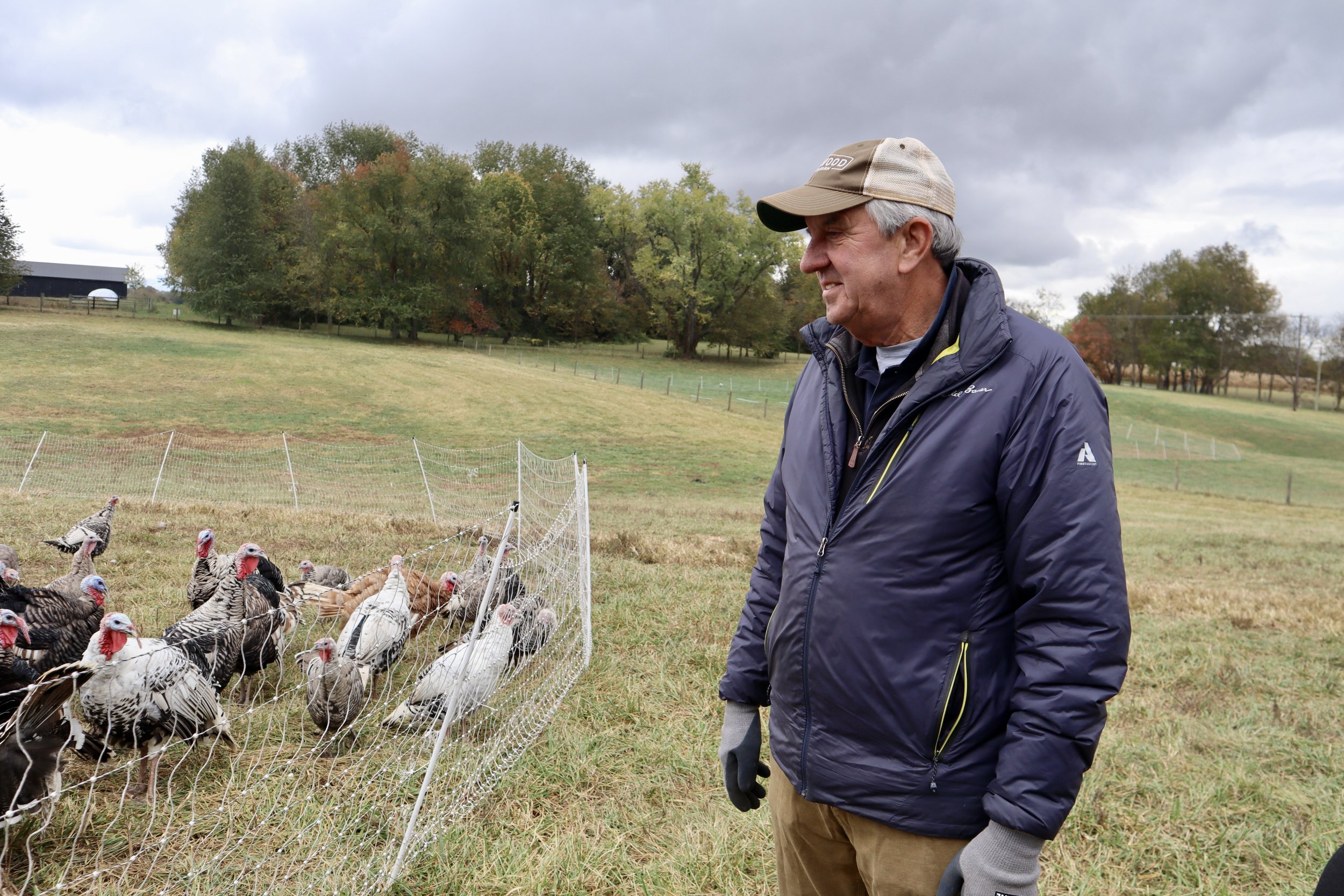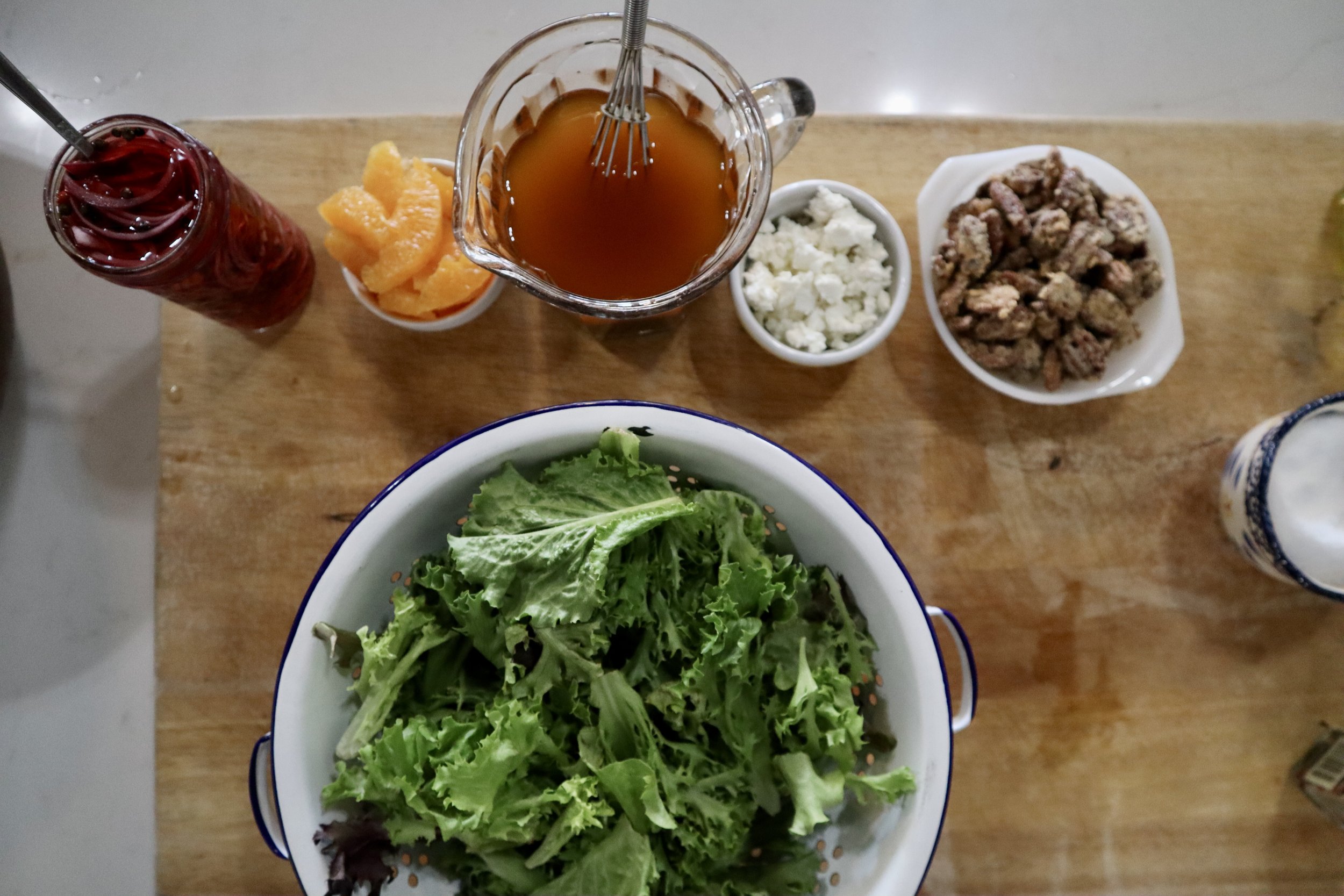A Respectable (and Tasty!) Bird
story by Donna Hecker & photography by Talitha Schroeder
Benjamin Franklin called the American turkey a respectable bird, a bird of courage. To which we’d add – and a bird of uncommon flavor. Especially if it grew up nearby in an open pasture, grubbing about, eating organic corn and soybeans on the side, and generally getting fat and tasty.
Over 99% of the turkey produced today in the United States is factory-farmed. Part of the one per cent that isn’t comes from places like Elmwood Stock Farm, a sixth-generation family farm located on 500+ acres in northern Scott County, Ky, and certified organic for over 20 years.
Elmwood Stock Farm is owned by Cecil and Kay Bell. Their son John Bell, who is married to Melissa, oversees vegetable crops and is a partner in the farm’s beef and pork production. Their daughter Ann Bell Stone and her husband Mac Stone manage the CSA farm share program, product marketing, and poultry and sheep production.
We’ve known Ann Bell and Mac for years, and now our former Holly Hill Events chef Charles Taylor has joined their team as the CSA and fulfillment supervisor. Elmwood was an early adopter of the CSA (Community Supported Agriculture) model and sells seasonal shares throughout the year, peaking at around 800 members in the summer months.
Charles showed off the newly expanded farm store; it stocks not only seasonal flowers, vegetables and pastured meats, but also pantry items like honey, spice blends, and BBQ and tomato sauces made from Elmwood produce. And as if this weren’t enough to keep everyone busy, Elmwood sells online and at farmers markets in Georgetown, Lexington and Cincinnati.
But we were there on a misty fall morning to talk turkey so Mac drove us out to meet his flocks on their home turf. Mac raises two types of turkey – a familiar, broad-breasted breed which arrives as day-old poults via the US Postal Service, and his heritage Narragansetts, which mate naturally and are born and grow up on the farm.
Both birds are kept inside for two to three weeks before going to pastures covered in netting to keep out predators like hawks and owls, until the young birds are too big to be carried off. The broad-breasted birds, which are easier to raise, have lots of white meat (as their name suggests) and shorter legs. They’re clumsy and awkward and, according to Mac, lack the intelligence of the Narragansetts.
Narragansetts, on the other hand, are graceful, sleek and observant. When we approach the flock, the toms form a protective circle around the hens hovering behind them. They call out to one another and keep their eyes on us the whole time we’re there. Mac says they’re very smart and communicate in lots of ways. “If one hears something it’ll chirp and raise its head. Then the rest of the flock starts to chirp and look around until the entire flock has a 360° view of what’s going on.”
Mac started raising Narragansetts after he was approached by the Livestock Conservancy, on the condition that he could raise them for meat. As he put it, “This is a farm, not a zoo. Why would I want to raise something I couldn’t eat?” His persistence paid off, the turkeys are popular with his customers, and he says that “Almost everybody that’s tried the heritage breed stays with it every year.”
If you’ve never had a heritage turkey, the first thing you’ll notice is how well-proportioned it is. The Narragansett’s larger thighs and long legs mean there’s a more equal ratio of white to dark meat. Because the birds take so long (about 26-28 weeks) to reach maturity, they have time to develop a layer of fat under the skin, which contributes to their rich flavor and juicy, tender meat.
Folks who’ve eaten Elmwood’s heritage turkey rave about its delicious meat and how beautifully it cooks up. A Cook’s Illustrated taste tester said the “meat was rich without gamy notes and had a texture like velvet.“
Putting a heritage turkey on the table proves Wendell Berry’s point that eating is an agricultural act. Supporting farmers like our friends at Elmwood Stock sustains a family and their staff, preserves fertile land, guarantees the survival of heritage breeds and heirloom varieties, carries on Kentucky foodways and traditions, and nurtures our hearts and health.
If your resources allow, we hope you’ll consider celebrating this year with food you grew yourself or bartered for, or purchased from someone you know, who tended it as carefully and lovingly as the Bells and Stones did at their Elmwood Stock Farm. We think there’s no better way to give thanks.
Related Content
Woodford Salad
This bright and festive salad brings the party to any meal with friends and family. Created by Chef Ouita while she was chef-in-residence at a well-known Woodford County distillery, it marries local sorghum and Kentucky bourbon in a lively vinaigrette you'll want to put on everything.
© 2023, Holly Hill Inn/Ilex Summit, LLC and its affiliates, All Rights Reserved






